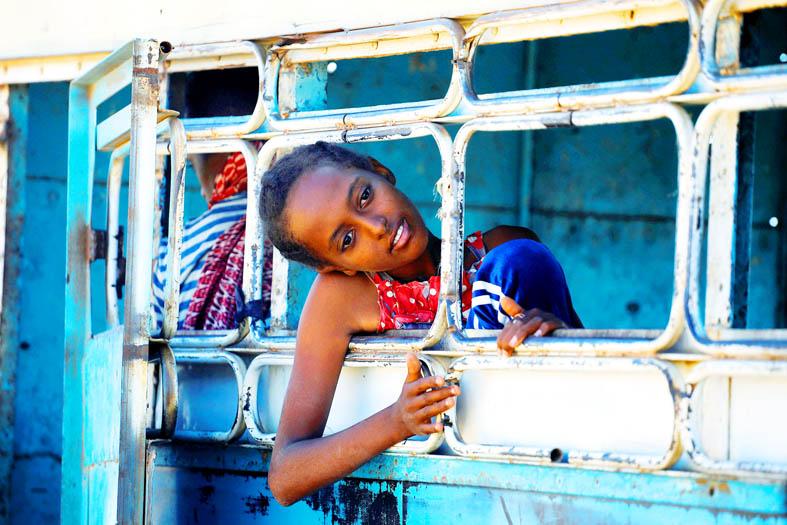Like thousands of others fleeing to Sudan from the conflict in Ethiopia’s northern Tigray region, 20-year-old Girum left his family and many of his possessions behind, but a friend managed to salvage his kirar, a small string instrument that he strums softly while waiting with fellow refugees to be transferred by bus to the camp of Um Rakuba, about 12 hours from the border.
He has had no contact with relatives since he fled early last month, when fighting between Ethiopian federal forces and the Tigray People’s Liberation Front began.
“My whole family has been separated. I don’t know where they are now,” Girum said.

Photo: Reuters
More than 46,000 people have crossed from Ethiopia, though since last week arrivals have slowed to a trickle. Like Girum, most have been ferried across the Tekeze River and into Sudan at Hamdayet, clutching few if any belongings.
Girum said that his instrument, which has strings stretched across a simple rectangular wooden frame, was retrieved after his home had been looted.
“The people who robbed our property ... only cared about gold and money,” he said.
Other Tigrayan refugees have said they fled attacks by government forces and allied militia.
The Ethiopian government denies it has killed civilians in the conflict. Both sides have accused the other of ethnic-based killings, while denying responsibility for carrying them out.
After arriving at Um Rakuba, Girum is to be assigned a plot of land with a tent, supplied with blankets, cooking utensils and food rations, but he has no idea how long he will stay.
In a speech to parliament on Monday, Ethiopian Prime Minister Abiy Ahmed urged those who fled to Sudan to return.
Dozens, keen to find belongings and relatives, and frustrated with the lack of humanitarian assistance in eastern Sudan, have crossed back into Ethiopia at Hamdayet over the past week, an aid worker said on Wednesday.
Girum was studying mechanical engineering, but dreams of becoming a musician and singer.
“If I ever feel sad, I just use the instrument to express how I feel,” he said.

A fire caused by a burst gas pipe yesterday spread to several homes and sent a fireball soaring into the sky outside Malaysia’s largest city, injuring more than 100 people. The towering inferno near a gas station in Putra Heights outside Kuala Lumpur was visible for kilometers and lasted for several hours. It happened during a public holiday as Muslims, who are the majority in Malaysia, celebrate the second day of Eid al-Fitr. National oil company Petronas said the fire started at one of its gas pipelines at 8:10am and the affected pipeline was later isolated. Disaster management officials said shutting the

US Vice President J.D. Vance on Friday accused Denmark of not having done enough to protect Greenland, when he visited the strategically placed and resource-rich Danish territory coveted by US President Donald Trump. Vance made his comment during a trip to the Pituffik Space Base in northwestern Greenland, a visit viewed by Copenhagen and Nuuk as a provocation. “Our message to Denmark is very simple: You have not done a good job by the people of Greenland,” Vance told a news conference. “You have under-invested in the people of Greenland, and you have under-invested in the security architecture of this

Japan unveiled a plan on Thursday to evacuate around 120,000 residents and tourists from its southern islets near Taiwan within six days in the event of an “emergency”. The plan was put together as “the security situation surrounding our nation grows severe” and with an “emergency” in mind, the government’s crisis management office said. Exactly what that emergency might be was left unspecified in the plan but it envisages the evacuation of around 120,000 people in five Japanese islets close to Taiwan. China claims Taiwan as part of its territory and has stepped up military pressure in recent years, including

UNREST: The authorities in Turkey arrested 13 Turkish journalists in five days, deported a BBC correspondent and on Thursday arrested a reporter from Sweden Waving flags and chanting slogans, many hundreds of thousands of anti-government demonstrators on Saturday rallied in Istanbul, Turkey, in defence of democracy after the arrest of Istanbul Mayor Ekrem Imamoglu which sparked Turkey’s worst street unrest in more than a decade. Under a cloudless blue sky, vast crowds gathered in Maltepe on the Asian side of Turkey’s biggest city on the eve of the Eid al-Fitr celebration which started yesterday, marking the end of Ramadan. Ozgur Ozel, chairman of the main opposition Republican People’s Party (CHP), which organized the rally, said there were 2.2 million people in the crowd, but